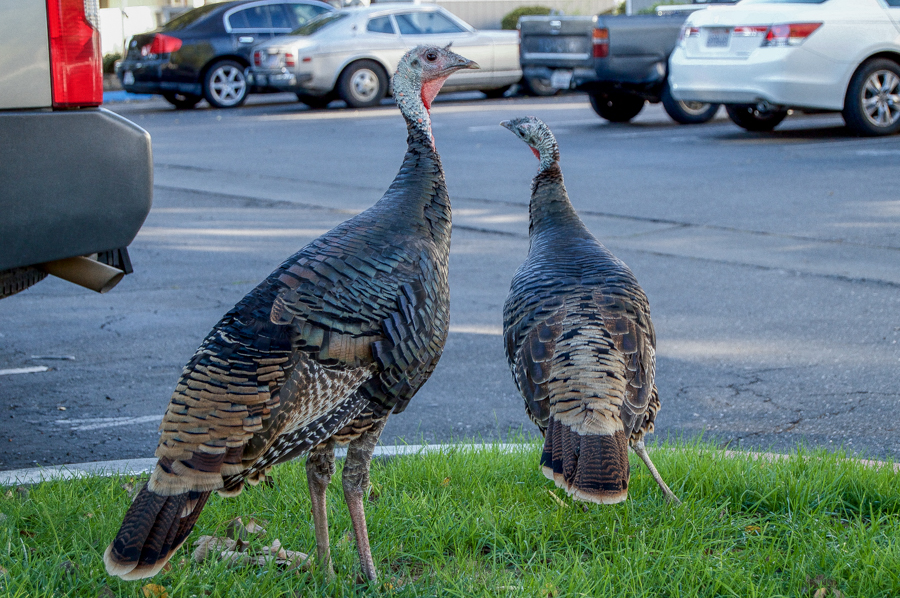
Increase in turkey population concerns Davis residents
Turkeys have been seen crossing the street, moseying around town and resting on the UC Davis Quad. Some have even been known to adhere to traffic laws.
But now, turkeys have been labeled as an increasingly pesky problem. A steady rise in the turkey population over the last few years has led to more turkeys dwelling in human-occupied areas.
John McNerney, a wildlife resource specialist for the City of Davis, has been fielding calls on the issue for years now, talking with everyone from homeowners to concerned businesses.
“The local wild turkey population has been on a steady increase since they were first observed in town in 2006,” McNerney said. “Since then, we’ve seen the population within the city limits increase by around eight to 10 birds per year.”
Several factors have contributed to population increase, including reproductive success and immigration from outside areas.
“Turkeys are doing quite well, not just in Northern California, but throughout many parts of the U.S.,” said Roger Baldwin, a UC Davis professor in the wildlife, fish and conservation biology department. “Mortality from hunting practices currently used is far exceeded by reproductive output.”
The turkey population has grown significantly due to limited control by traditional hunting practices. Furthermore, the feeding of these turkeys has notably changed the dynamic between turkeys and city life.
“Direct feeding of wildlife, including turkeys, can encourage wildlife to move into human-populated areas. It also negates that fear that wildlife have of humans,” Baldwin said.
Feeding wildlife is not only discouraged, it is also illegal, as it assists the growth of the turkey population and causes the birds to become less nomadic. This is why residents are now seeing turkeys more concentrated in neighborhoods and densely populated areas. However, Baldwin affirms that unintentional feeding, rather than intentional feeding, likely has a greater impact on the influx of turkeys seen downtown, in neighborhoods and on the UC Davis campus.
“There is an abundance of food for many wildlife species within city limits,” Baldwin said. “All [the turkeys] need to do is overcome their fear of humans, and they can exploit these food sources.”
The increased presence of turkeys has led to a widespread rumor that hunting turkeys within city limits will be made legal. However, McNerney quashed this idea, reporting that the City of Davis is looking into other ways to reduce the levels of turkeys seen on Davis streets.
“The rumor likely came from a recent KCRA news report in which I was misstated,” McNerney said. “The city has been researching multiple management options to control the growth of the population. The other management options that the city is currently researching include mass capture and relocation, cull or sterilization.”
It is, as of yet, unknown which course the city will take. The management options mentioned by McNerney are all effective methods, but they take time and money, and there is no guarantee that this will control the turkey population.
However, Alan Krakauer, assistant project scientist and lecturer in the department of evolution and ecology at UC Davis, stated that this population increase could just be part of a larger cycle.
“While turkey populations have increased over the long term, they also exhibit up and down cycles, so it could be that we won’t always see the population level we have now,” Krakauer said.
Krakauer also suggested that residents try to take an interest in the birds for reasons outside of hunting or controlling their population.
“While I understand the potential impacts to humans and to the environment of large turkey populations, part of me is thrilled to have turkeys doing so well,” Krakauer said. “They have incredibly interesting social lives and spectacular mating displays and it is a real treat to get to see this in our own backyard.”
According to McNerney, the city discourages residents from feeding wild turkeys and reminds residents to limit unintentional feeding through bird feeders, garbage cans and other open food sources. Without these food sources, turkeys will resume their naturally nomadic lifestyle and reduce negative impacts to the community. For more information about the turkeys in Davis, visit the City of Davis website.
Written By: Samantha Solomon – city@theaggie.org



